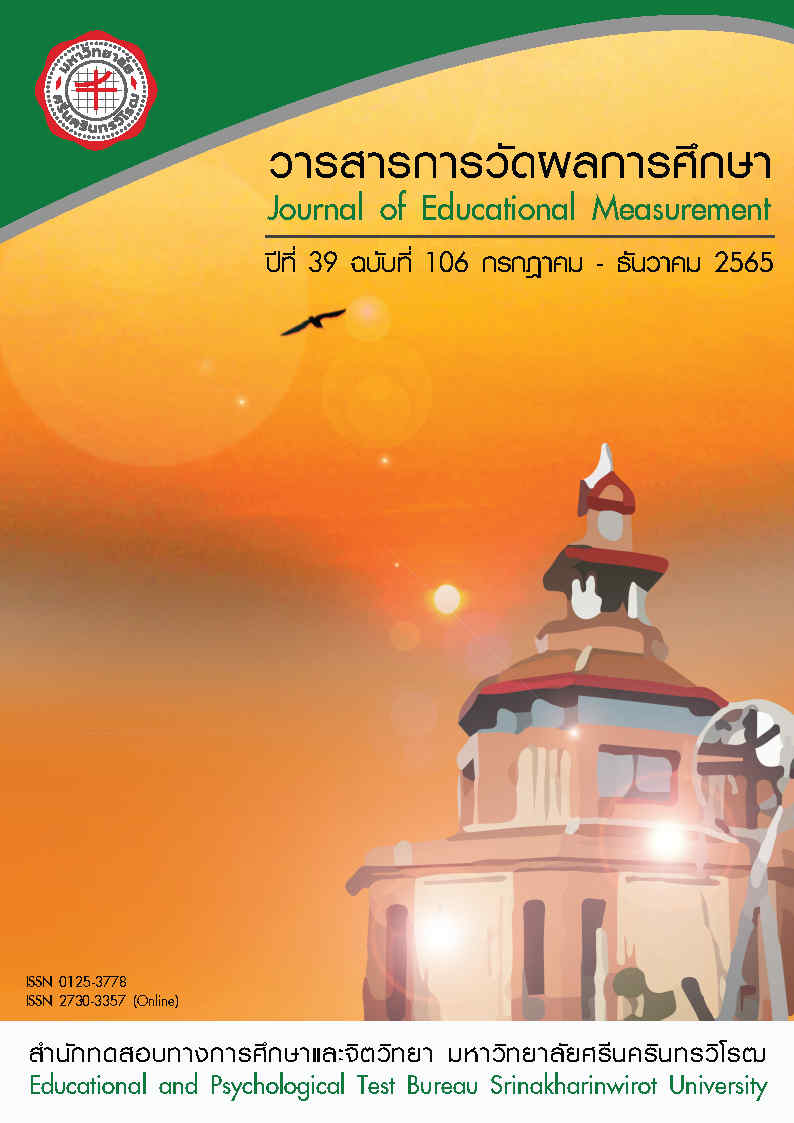Development of Measurement Scale on mathematical systems thinking for upper secondary school students
Keywords:
systems thinking, development of scale, mathematicalAbstract
The purposes of this research were 1) to develop the mathematical systems thinking scale for upper secondary school students and 2) to verify the psychometric properties of the mathematical systems thinking scale for upper secondary school students. The sample consisted of 600 upper secondary school students, using a multi-stage random sampling. The research instrument was an evaluation form and mathematical systems thinking test. The test was a mixed format. the questions based on everyday situations. Data were analyzed by using SPSS for the value of corrected item-total, t-test and SPSS for the result of confirmatory factor analysis (CFA).
The research findings were as follows: 1) The evaluation result of the mathematical systems thinking scale for upper secondary school students by 5 experts was at a high level. 2) The test of the mathematical systems thinking scale for upper secondary school students which is mixed-format tests containing both multiple-choice items and open-ended question items, in total 18 questions. The psychometric propertie of the tests consisted of t-test independent can discriminate examiner, the relationship between exam scores and mathematics grades was the low-level positive correlation (rxy= .418), construct validity (Chi-square=4.58, df=4, P=0.329, GIF=0.997, AGIF=0.987, RMSEA=0.016) and reliability was in the high level ( = .818).
References
กระทรวงศึกษาธิการ. (2560). ตัวชี้วัดและสาระการเรียนรู้แกนกลาง กลุ่มสาระการเรียนรู้คณิตศาสตร์ (ฉบับปรับปรุง พ.ศ. 2560). สำนักงานคณะกรรมการการศึกษาขั้นพื้นฐาน. กรุงเทพมหานคร: โรงพิมพ์ชุมนุมสหกรณ์การเกษตรแห่งประเทศไทย จำกัด.
ชยานันท์ โคสุวรรณ์, สุนทร คำนวล และธัญญรัศม์ ทองคำ. (2560). การพัฒนาเครื่องมือประเมินการเรียนรู้โดยใช้ปัญหาเป็นฐาน. วารสารการวัดผลการศึกษา. 34(96). 30-44
โชติกา ภาษีผล. (2559). การวัดและประเมินผลการเรียนรู้. กรุงเทพมหานคร: โรงพิมพ์แห่งจุฬาลงกรณ์มหาวิทยาลัย.
ธีรภัทร สุดโต และอภันตรี นาคอำไพ. (2560). การวัดเจตคติ. วารสารการวัดผลการศึกษา. 34(96). 1-14
ประจักษ์ ปฏิทัศน์. (2562). การคิดเชิงระบบและความคิดสร้างสรรค์. กรุงเทพมหานคร: สำนักพิมพ์จุฬาลงกรณ์มหาวิทยาลัย.
ปารมี ศรีบุญทิพย์ และคณะ. (2560). การวิเคราะห์องค์ประกอบเชิงยืนยันของการคิดเชิงระบบของนักเรียนชั้นมัธยมศึกษาปีที่ 1 โรงเรียนสาธิตมหาวิทยาลัยของรัฐ สังกัดสำนักงานคณะกรรมการการอุดมศึกษา. Veridian E-Journal, Silpakorn University 10(กันยายน-ธันวาคม 2560). 38-51.
มกราพันธุ์ จูฑะรสก. (2562). การพัฒนากระบวนการคิดอย่างเป็นระบบเชิงสร้างสรรค์: การสะท้อนคิดด้วยเทคนิคตะกร้า 3 ใบ. วารสารวิจัยและพัฒนาหลักสูตร. 9(2). 203-222
ฤทัยรัตน์ ชิดมงคล และสมยศ ชิดมงคล. (2560). การคิดเชิงระบบ: ประสบการณ์สอนเพื่อพัฒนาการคิดเชิงระบบ. วารสารครุศาสตร์. 45(2). 209-224.
Alavi, M., Visemtin, D.C., and others. (2020). Chi-square for model fit in confirmatory factor analysis. Journal of Advanced Nursing. 76(9), Retrieved from ttps://www.researchgate.net/publication/340864596_Chi-square_for_model_fit_in_confirmatory_factor_analysis
Anderson, V., & Jonhson, L. (1997). Systems Thinking Basics: From Concepts to Causal Loops. Waltham: Pegasus Communications.
Assaraf, O. B.-Z, Orion, N. (2005). Development of systems thinking skills in the context of earth system education. Journal of Research in Science Teaching, 42(5), 518-560 Retrieved from: https://onlinelibrary.wiley.com/doi/abs/10.1002/tea.20061
Bounchanh Vongthongkham, Poliny Ung และปริญญา เรืองทิพย์. (2563). อิทธิพลของอัตมโนทัศน์ต่อทักษะทางคณิตศาสตร์ โดยมีแรงจูงใจฝาสัมฤทธิ์เป็นตัวแปรคั่นกลาง. วารสารการวัดผลการศึกษา. 37(102). 219-229
Depi Oktasari, Ismet and S M Siahaan. (2019). Validation construct: Confirmatory Factor Analysis (CFA) instrument scientific communication skill students in learning physics. Journal of Physics: Conference Series, 1567, Retrieved from https://iopscience.iop.org/article/10.1088/1742-6596/1567/3/032095/pdf
Hair J.F., Hult G.T.M., Ringle C.M., Sarsted M., (2017) A primer on partial least squares structural equations modeling (PLS-SEM) (second edition), Los Angeles, SAGE.
Senge, Peter. (1993). The Fifth Discipline: The Art and Practice of Learning Organization. London: Century Business.
Waters Foundation. (2017). The Impact of the Systems Thinking in School in School Project: 20 years of Research, Development and Dissemination. Retrieved from: http://watersfoundation.org/wp-content/uploads/2017/ 07/STIS_Research.pdf




